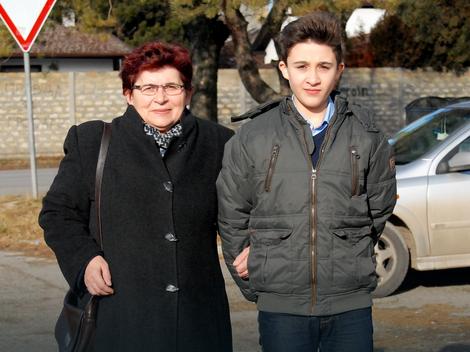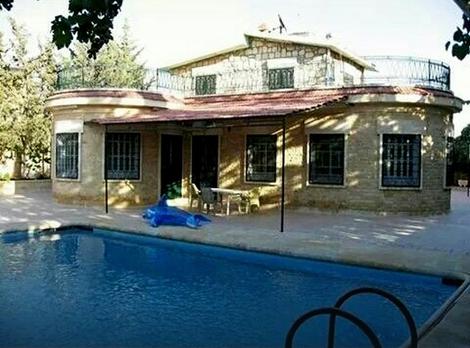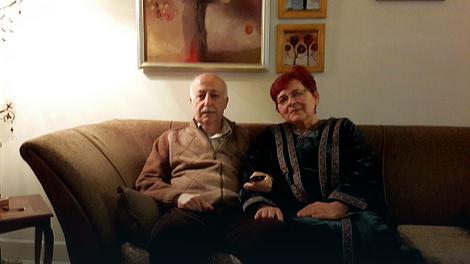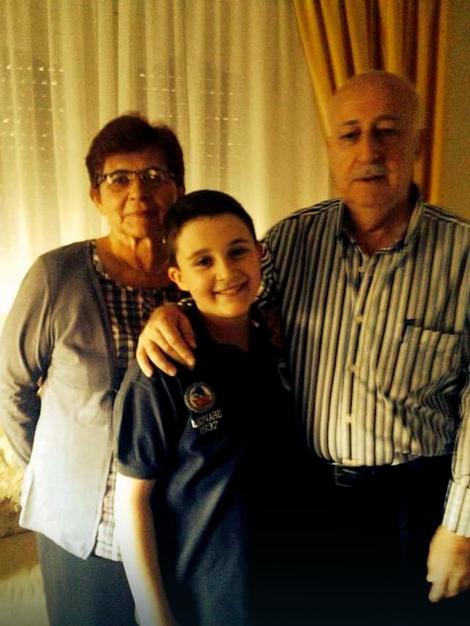Author: Biljana Vučković | 04. 01. 2017 to 11: 40h
http://www.blic.rs/vesti/vojvodina/moj-zivot-u-alepu-je-bio-bajka-suboticanka-se-posle-31-godine-u-siriji-vratila-u/35c8nmy
Aleppo, the second largest city in Syria, in Serbia known for wartime suffering and migrants fleeing from the horrors, for Dr. Cate (Kata) Gurinović Kasab (64) will always remain a paradise on earth.

After 31 years of living in the five-million city she last July returned to Subotica and in her hometown brought daughter Lina (38), Tanya (33) and Jude (21) and grandson Ramie Aboudana (13). Dr Samir Kasab, Katin's husband, remained in Aleppo, but in a few months the family will again be together and decide where and how to proceed.
While she is re-adjusting to life in Subotica, Kata gladly recalled going to studies in Rijeka where in 1976 she met the Syrian, the future gynecologist. They were married in Slovenia and then they gave birth to the eldest daughter, while the next was born in Croatia, and the third in Aleppo.
The doctor does not refuse to talk about the five years of war, but, she says, she rather prefers to speak why her earlier life in Aleppo was a fairy tale.
- It was not unusual that Samir was from Syria. Together we were educated and employed in Koper, and my life with him in Aleppo is the most beautiful thing you can imagine. The atmosphere was like in every warm family home, as our guests have always been numerous, and on one occasion he come 90 of them to visit. While we still had fun I visited Samir's family and they all accepted me nicely. I was very excited to see the city and the people, and that feeling never left me - tells Kata Gurinović Kasab.

She learned Arabic from relatives and friends, most from her mother in law, and when she opened a private clinic, her husband until he began working in a public hospital, sat next to her and translated patient diagnosis and advices. She accepted all the traditions of Aleppo and he speaks fondly of family gatherings.
- My husband has three brothers, and four sisters, and other relatives with us has always been more than 40, and there is a custom to for the most simple visit are preparated at least four types of food. Aleppo main courses are stuffed zucchini and small eggplants, so-called softer, but for the holidays they make stuffed vine leaves, thinner than a pencil and put on the meat to be even tastier. It is popular also kibe, a dish of specially processed wheat that is milled to make it as a puree, and thereto is added to the meat. Exist the good habit of neighbor carries food to neighbor and this was particularly important when the war started because we are all in the building became as close as relatives - says Kata.

No one has ever asked her to wear a headscarf, and she explains that in Syria a separate women's and men's weddings are kept, that women never take her husband's surname but keep their own, and that boys and girls only after sixth grade attend school together.
- Aleppo is famous for its historical monuments, Aleps's tower and the old covered shopping center 17 kilometers long. Until he the war started, I experienced only good things. We had a great apartment and a cottage. For Beira, one of the biggest holidays, all residents, regardless of whatever they were doing, they bought new clothes. For all citizens of the state health services are free, only to be paid if you wanted a private doctor. I was shocked that in Serbia people raise a loan to buy children's books, while there for all elementary school students was free of charge and in high school it was paid a symbolic price. A lot has changed because of the war, wages are now small, prices are high, but still costs to live more in Serbia - says Kata.

She notes that her children and grandson are not migrants, but they came to her hometown. Although she lived on the frontline Kata has long refused to leave the city, but her husband was afraid for the children. The first year of the war in 2011 were not felt until the last was a nightmare because the building in which they lived was often the target of untamed warriors.
- We had a bedroom, which we thought was safe. Rami wanted that we lie next to each other and said if anything happens it's best for all of us die. Departure of Ramie to school was critical because the school bus could not come for him. Behind our building was the Palace of Justice in which there were snipers so the Syrian soldiers often gave me a sign when I can safely go. We had adjusted how we knew and understood, until one night the Syrian army has asked us to leave the apartment. We moved in with relatives, but that part of the city also became a focal point of violent conflict. Thanks to my Serbian citizenship without any problem we got out of the country - says doctor.
During three decades of her life in Aleppo her sister Mirjana repeatedly visited her, the greatest support of her life, and the greatest joy she felt when her mother came to visit her. As soon as the war started the Serbian embassy offered to Kate to return to Serbia, but she has repeatedly refused to. With her husband, who is still working at the hospital, she speaks every day, and for five months she is in Subotica she was contacted by many friends and is looking forward to meeting generation from elementary school.
---
IZAKOIC










































